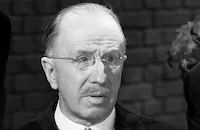Along Came Youth
Cast & Crew
Lloyd Corrigan
Charles [buddy] Rogers
Frances Dee
Stuart Erwin
William Austin
Evelyn Hall
Film Details
Technical Specs

Synopsis
Larry Brooks, a young American sportsman stranded in London, takes a job as a sandwich man, advertising for a tailor shop, to keep himself alive, as does his buddy, former horsetrainer Ambrose. By accident he meets Elinor Farrington, daughter of an aristocratic but impoverished British family, and they fall in love. Later, Larry gets a job as chef in the Loamshire mansion of a wealthy South American, Señor Cortés, and his portly wife, with Ambrose as his assistant; learning that Elinor's family lives nearby, he pays them a visit, but thinking he is an imposter, Lady Prunella--her mother--orders him away. When Cortés goes away, Larry gains the good graces of the mistress with his desserts, actually prepared by other kitchen helpers, and she helps him regain his horse, Gangster. On the day of a steeplechase, Larry invites the local aristocrats to a hunt breakfast, but it is interrupted by the return of Señor Cortés, who brands his chef as an imposter; but he rides Gangster in the race, regains his fortune, and claims Elinor.

Cast
Charles [buddy] Rogers

Frances Dee

Stuart Erwin
William Austin
Evelyn Hall
Leo White
Mathilde Comont
Betty Boyd

Arthur Hoyt
Sybil Grove
Herbert Sherwood
Charles West
Macon Jones
Billy Wheaton
George Ernest
Gordon Thorpe
John Strauss
Crew

Film Details
Technical Specs

Articles
Frances Dee (1907-2004)
She was born Jane Dee, on November 26, 1907 in Los Angeles, California. She was the daughter of an Army officer who grew up in Chicago after her father was transferred there when she was still a toddler. After he was re-stationed to Los Angeles in the late '20s, Jane accompanied him back.
Although she didn't harbor any serious intentions of becoming a star, Dee, almost out of curiosity, found work in Hollywood as an extra. With bit parts in small features in the films Words and Music (1929), True to the Navy, and Monte Carlo (both 1930), it didn't take long for studio executives to take notice of the sleek, stylish brunette. They changed her first name to Francis, and gave her a prominent role opposite Maurice Chevalier in one of the first all-talking musicals, The Playboy of Paris (1930).
She proved she could handle drama in her next big hit, An American Tragedy (1931) as Sondra Finchley, the role played by Elizabeth Taylor in the George Stevens' remake A Place in the Sun (1951). She met her husband Joel McCrea while filming The Silver Cord (1933), and after a romantic courtship, were married that same year in Rye, New York. It was well-known within film industry circles that their 57-year marriage (ending in 1990 when McCrea passed away) was one of the most successful among Hollywood stars.
From there, Dee played important leads in several fine motion pictures thoughout the decade: Little Women (1933), starring Katharine Hepburn; Blood Money (also 1933), where she was cast thrillingly against type as a sex-hungry socialite whose taste for masochistic boyfriends leads to harrowing results; Of Human Bondage (1934), in which she played Leslie Howard's devoted girlfriend; The Gay Deception (1935), a charming romantic comedy co-starring Frances Lederer; Wells Fargo (1937) a broad sweeping Western where she again teamed up with her husband McCrea; and the classic period epic If I Were King (1938) making a marvelous match for Ronald Colman.
Dee's film career slowed considerably in the '40s, as she honorably spent more time raising her family. Still, she was featured in two fine films: the profound, moving anti-Nazi drama So Ends Our Night (1941) with Fredric March; and Val Lewton's terrific cult hit I Walked with a Zombie (1943), portraying the inquisitive nurse trying to unravel the mystery of voodoo occurrences on a West Indian plantation. Dee officially retired after starring in the family film Gypsy Colt (1954) to commit herself full-time to her children and her husband.
For those so inclined, you might want to check out Complicated Women (2003), a tight documentary regarding the racy Pre-Code films that represented a realistic depiction of the Depression-era morality before the Hays code took over Hollywood in 1934. Frances Dee, although well in her nineties, offers some lucid insight into her performance in Blood Money, and clearly demonstrates an actor's process of thought and understanding in role development.
She is survived by three sons including the actor Jody McCrea, who found fame as "Bonehead" in the AIP Beach Party films of the '60s, six grandchildren and two great-grandchildren.
by Michael T. Toole















